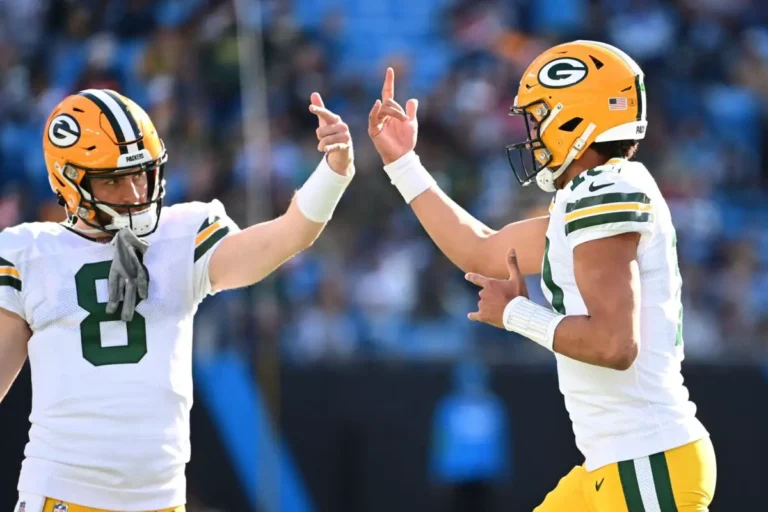The Green Bay Packers are experiencing one of the most extraordinary runs in NFL history. Their streak began in 1992 when they traded a first-round pick for Hall of Fame quarterback Brett Favre. This move was followed by the 2005 drafting of another future Hall of Famer, Aaron Rodgers.
Though other teams have had back-to-back Hall of Fame quarterbacks—most notably the San Francisco 49ers with Joe Montana and Steve Young—no team has ever managed to transition from one great quarterback to another three times in a row.
While it is premature to declare Jordan Love, Green Bay’s first-round pick in the 2020 NFL Draft, as the next Hall of Fame-bound Packers quarterback, his first season as the team’s starter has been impressive.
In fact, his performance surpasses the inaugural seasons of both Favre and Rodgers. Love completed 64.2% of his passes for 4,159 yards, 32 touchdowns, and 11 interceptions, achieving a passer rating of 96.1.
Comparatively, Rodgers completed 63.6% of his passes for 4,038 yards, 28 touchdowns, and 13 interceptions with a passer rating of 93.8, while Favre had a 64.1% completion rate for 3,227 yards, 18 touchdowns, and 13 interceptions, resulting in a passer rating of 85.3.
As discussions about Love’s next contract intensify, it’s clear that he is poised to become the face of the franchise, following in the footsteps of Favre and Rodgers.
Former Green Bay Packers Quarterback Aaron Rodgers Tried to Be Better than Brett Favre in One Important Way
In 2004, the Packers secured the NFC North title with a 10-6 record. Favre delivered another stellar season, completing 64.1% of his passes for 4,088 yards, 30 touchdowns, and 17 interceptions, earning a passer rating of 92.4. Despite their regular-season success, the Packers were eliminated in the first round of the playoffs by the Minnesota Vikings. The following year, the Packers surprised many by selecting Aaron Rodgers with their first-round pick in the 2005 NFL Draft.
Much like the reaction to Love’s selection, Green Bay fans were not pleased with Rodgers’ draft pick. Then-general manager Ted Thompson faced heavy criticism, similar to the scrutiny Brian Gutekunst encountered for drafting Love. Favre himself was notably displeased with the decision and did not take on a mentorship role with Rodgers, instead directing his frustrations toward the front office.
By 2020, Rodgers found himself in a similar situation as Favre, with the Packers drafting Love. Remembering his own struggles as a new quarterback without support from the starter, Rodgers committed to not letting Love face the same challenges. Despite Rodgers’ protracted and contentious battles with the Packers’ organization, he made efforts to aid Love’s development and growth.
Jordan Love’s Leadership and Contract Extension
Heading into the 2024 NFL season, the primary topic for the Packers is Love’s contract extension. The question is not if Love will re-sign, but when and for how much. Unlike Rodgers, who often skipped offseason activities during his final seasons with the Packers, Love has fully participated in all team activities, demonstrating his commitment to the team.
Furthermore, Love has taken a different approach to leadership, particularly with his body language. In contrast to Rodgers, who was often criticized for his negative body language—throwing tablets, yelling at players, and rolling his eyes—Love emphasizes positivity. He stated, “You never want to have bad body language, whether it’s at somebody or on a play you might’ve messed up on. Just always trying to be positive with body language and those little things.”
Love’s awareness of how poor body language affected younger players under Rodgers’ leadership has influenced his own approach. As the leader of a team predominantly composed of younger players, Love is determined to create a positive environment, ensuring they do not endure the same negative experiences.
